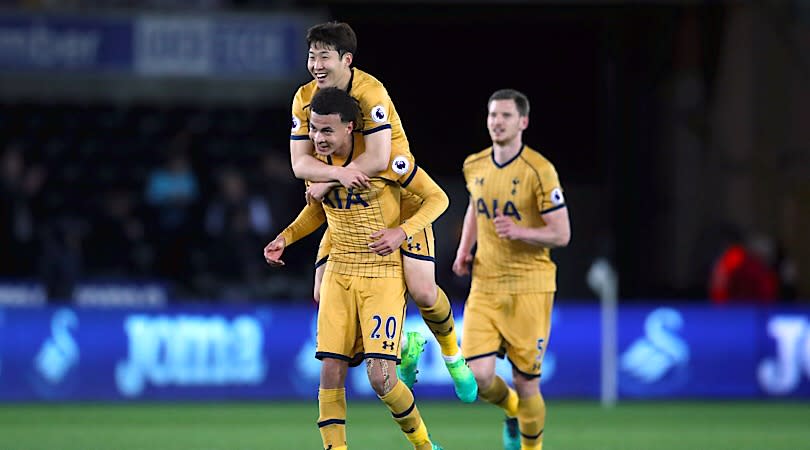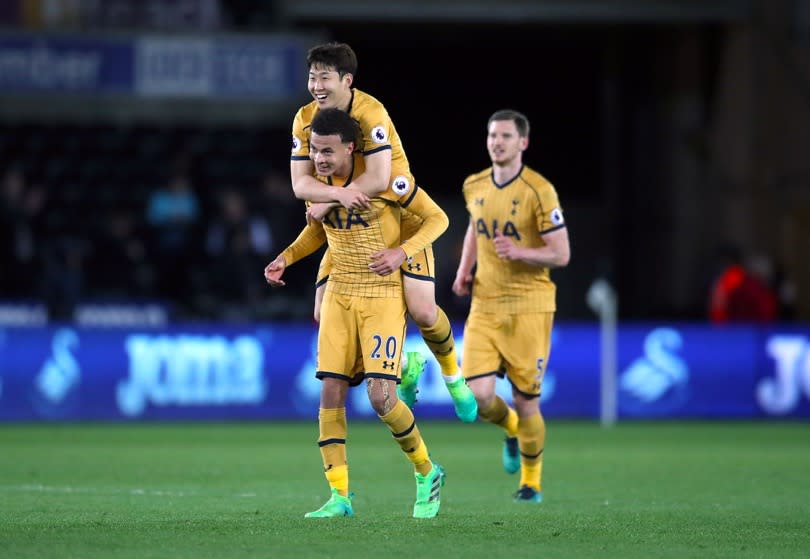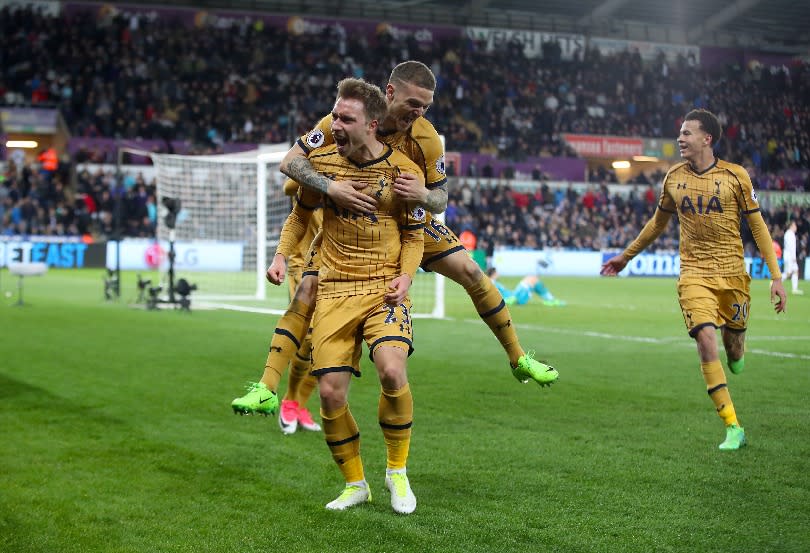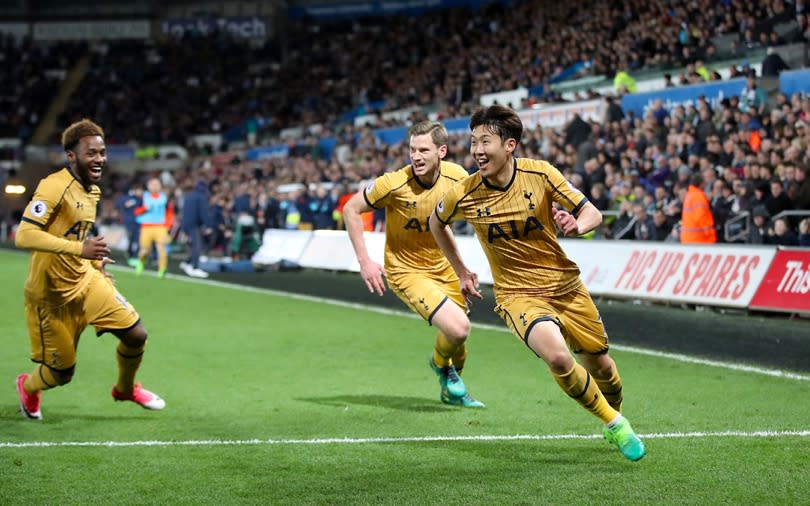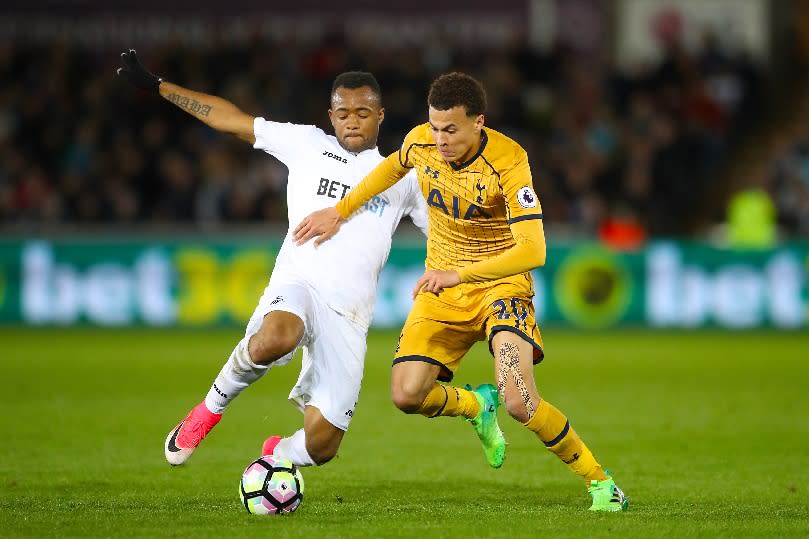How Tottenham have become the Premier League's most resilient side
Tottenham’s world has changed. It’s long been accepted that Chelsea are already over the hill in this year’s Premier League, so Mauricio Pochettino’s players have been quietly winning games and accumulating points with no defined upward ambition. Champions League qualification of course remains a priority, but Spurs have enough of a points buffer to breathe fairly easily now.
Crystal Palace’s win at Stamford Bridge didn’t quite turn the title race on its head, because it would still take a monumental collapse for Antonio Conte not to win his maiden Premier League championship from here, but suddenly Pochettino and his players have something slightly more to play for. With that has come the first grip of pressure and, inevitably, a reminder of last year.
For 88 minutes against Swansea City on Wednesday night, their sensitivity to that trauma seemed as acute as ever.

Spurs are playing under various injury limitations. With Harry Kane and Danny Rose still missing, and Hugo Lloris too unwell to take part here, Pochettino fielded a depleted side. Son Heung-min and Moussa Sissoko laboured hopelessly in attack, tripping over shadows and stumbling over their first touches. Behind them, the creative band of midfielders were starved of space and forced to push their passes flat and wide.
READ MORE: Vertonghen backs Janssen to be a success at Tottenham
READ MORE: Five things we learned about Tottenham after Swansea rescue mission
READ MORE: Arsenal and Liverpool target Lacazette could move this summer, admits Lyon director
Once Wayne Routledge had given the hosts a 11th-minute lead and Swansea felt comfortable retreating behind the ball, those gaps got narrower still. For the next 78 minutes, the game settled into its pattern.
Tottenham would advance with the ball. Swansea would fall back into a deep, narrow shape - and whatever came next was invariably disappointing from the visitors: a cross with no recipient, a through-ball with no runner.
And, hundreds of miles of away, the barbs begun to tumble out of social media: weak, pitiful Spurs, closing a door which had been opened for them only days before. Whether real or imagined, the visiting support could likely imagine the snark from all the way back in London. Arsenal were winning, the gap between the two clubs was closing and it - “it” - was happening again.

Yet these are strange times. Even during their Harry Redknapp era revival, Spurs were a team of momentum. They were wonderfully gifted and could play some of the best football in the country. But they would periodically run into the wrong opponent, or run out in the wrong mood, and drop points in desperately disappointing circumstances. They would play well and win, or play badly and lose; rarely were those lines blurred.
By contrast, Pochettino’s team have always seemed capable of snatching undeserved points. Even in the first six months of his time at White Hart Lane, when performances could often look hopelessly disjointed, his side would find a way to win. Late winners were snagged against Hull, Aston Villa and even here at Swansea in late 2014. That mini sequence created a trend which survives to this day.
READ MORE: Premier League Round-Up - Chelsea regain control of title race
They are now the side who score the goals away from home that they used to concede at White Hart Lane. They capitalise on their opponent’s fleeting fragilities and they exploit the most minor mistakes. Endemic weaknesses have become strengths.
When Paul Clement emerged for his press conference, he looked heartbroken. He looked like a manager who had seen his players execute his gameplan perfectly for 88 minutes, defend with almost unbroken concentration, and still come up short. He was right to feel that way: Swansea deserved to win at the Liberty Stadium. They had done enough.
In this instance, no tactical evaluation can adequately illustrate Spurs’s recovery. They didn’t do anything particularly different in those final, fraught minutes - they just stubbornly persisted with a routine which had failed them until that point. They kept pushing. Having tried to barge the Swansea door down all night long, and having not seen it even creak, they gave it one last shoulder.

Finally, the hinges snapped and the frame broke. Dele Alli made one late run to the backpost and was rewarded as a deflected Christian Eriksen shot fell at his feet. Seconds later, Son Heung-min produced a final burst into the box and, having been found by Vincent Janssen’s artful flick, pushed the ball underneath Lukasz Fabianski.
Mayhem in the away stand. Because of the win, of course, but also because these supporters - this particular fanbase - can’t quite believe that they have a team who possess this priceless virtue. When it’s time to win a game and when the pressure is at its strongest, Tottenham now have the clearest head.
It’s something which undeniably comes from the head coach. Perhaps this is a consequence of Pochettino’s uncompromising approach to team-building. He has never shown any tolerance whatsoever for insubordinate players and has jettisoned anyone who hasn’t entirely bought into his methods.
The consequence of that appears to be a team who, even against their better judgement, believe that they will always prevail.
Swansea were mortally wounded by Son’s goal and by the time Eriksen curled in the game’s fourth, they were on the canvas. Still, it was easy to marvel at the pace and energy within that move, in the 96th minute of Tottenham's second game in four days. It was impressive in its ruthlessness and emblematic of the step-on-their-neck habit that this side has developed.
The cliche dictates that it is always good to win when not playing well. In this instance, that’s reductive. Spurs didn’t play well, but it was unwavering faith in their systems that lay at the root of their goals and served the truest barometer of their overall health.
They didn’t work. They didn’t work. They didn’t work. But then, eventually, they did.
Tottenham have now recovered 17 points from losing positions this season. Given the financial disadvantages they face compared to the teams that they're competing with at the top of the table and the injuries they’ve suffered, that’s a sign of their newfound psychological emboldening.

 Yahoo Sport
Yahoo Sport 






































